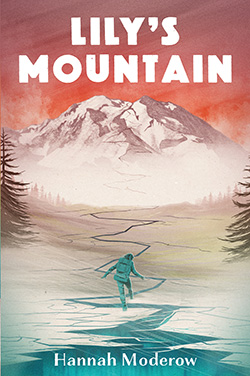 This month I visited Alaska’s Denali National Park—not in person, but in prose—when I read Hannah Moderow‘s debut novel Lily’s Mountain. From grizzly bears to swarms of mosquitoes, frigid streams, rustic outhouses, a run-in with a porcupine, and a deep crevasse in the ice, the story takes readers on Lily’s quest to find her missing mountain-climbing, Scrabble-playing father. It’s a great read!
This month I visited Alaska’s Denali National Park—not in person, but in prose—when I read Hannah Moderow‘s debut novel Lily’s Mountain. From grizzly bears to swarms of mosquitoes, frigid streams, rustic outhouses, a run-in with a porcupine, and a deep crevasse in the ice, the story takes readers on Lily’s quest to find her missing mountain-climbing, Scrabble-playing father. It’s a great read!
And today, in honor of bringing Hannah to my blog, I’m doing a BOOK GIVEAWAY! Scroll to the end of this interview for details on winning a copy of Lily’s Mountain and ALSO a book I mentioned in last month’s post: Get a Grip on Your Grammar by Kris Spisak.
A.B. Westrick: Welcome, Hannah!
Hannah Moderow: Thank you for having me, Anne. I think back so fondly to our days together as students at Vermont College of Fine Arts.
ABW: I loved meeting you at VCFA, and I can’t believe it’s been seven years since we graduated. Feels like yesterday. And look at us now—still geeking out over the craft of writing!
So tell me about the poem by Robert Service that you included in Lily’s Mountain. Talk about grounding readers in the setting! His words really drew me in:
What an engaging, lyrical poem. And my question is about your decision to have Lily remember this poem as her dad’s favorite. Did you plan to include the poem from the get-go? Was it in your first draft of the story, or did it emerge in a later draft?
HM: When I write novels, I typically begin with broad character ideas (think: Dad is a wordsmith and passionate mountain-climber). The more I write, the more I discover about the character.
From the earliest drafts of Lily’s Mountain, I knew that Lily’s dad loved poetry. I knew he was particularly fond of poems about the wilderness that he felt called to explore. This specific poem, however, emerged several years into writing the novel, once I knew more about Lily and her father—and knew their connection was strongest when they were in the Wild together. While Lily’s dad is not present with her physically throughout this novel, this poem captures Lily’s belief that she can connect with her father in the Wild places they both loved.
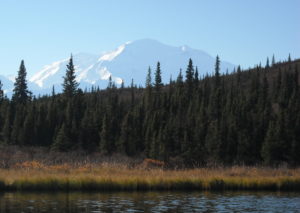
ABW: That connection really resonates through the novel. And it works. And that makes me wonder what didn’t work. What scenes were the hardest for you to write (what sections demanded the most revision)? Did you end up having to scrap any chapters that weren’t working, and if so, can you give me an example of something you deleted?
HM: For every chapter that appears in the novel, there were at least two or three deleted chapters. I wrote this novel many different times, with different plotlines, from different perspectives (first person present, first person past, third person past), and I even dramatically changed characters. It was an eight-year process from my first draft to ultimate publication.
ABW: Eight years! Well, there you go—the power of perseverance.
HM: Yes, it was quite a process! In the first draft, Lily’s father was missing in the McKinley River after having successfully descended Denali. It wasn’t until a year into writing the story that he was missing in a crevasse on Denali. And that’s the beauty and the challenge of writing a novel: it’s important to experiment until the book finds the right voice and form.
ABW: I love that: the beauty and the challenge.
HM: The one thing that remained constant throughout was Lily’s devotion to her father and their shared bond experienced in Denali National Park.
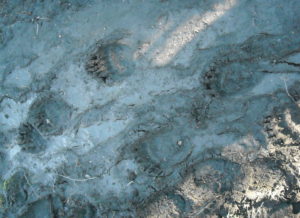
You might be interested to note that in the first drafts, Lily’s mom goes on the trip to Denali with Lily and Sophie. Maybe this would have appeased editors over the years who rejected the novel, saying, “I just couldn’t believe her mom would let her two girls go on this dangerous journey.”
Here’s why I decided not to follow this suggestion: Lily is a savvy Alaskan girl. She might only be twelve years old, but she has lived an adventurous childhood in Alaska with a family that loves hiking, camping, and climbing. Lily wouldn’t have been equipped to brave an urban landscape at that age, but she was skilled and able to travel in the outdoors, especially with her older sister Sophie by her side.
ABW: Good point. Urban born-and-bred editors might be fine to let children loose in a city (a notion that sends my worry-meter skyrocketing), not in the woods. (Me? I’ll take a campground over a city any day. I’m so NOT a city girl.)
Now, tell me about Lily herself. How much of you is in this courageous, outdoorsy protagonist?
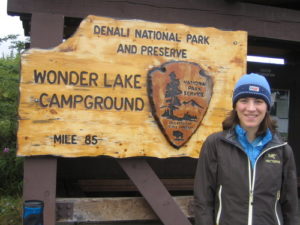
HM: I’m an outdoorsy girl like Lily, and I do happen to LOVE gummy bears. But I’m not Lily. In many ways, her character is a collection of traits that inspire me—and traits that I hope I can build in my own life. She is brave. She is determined. She is inspired by the beauty and harshness of wilderness. And she’s fiercely devoted to her family.
I also admire Lily’s ability to live in the moment. Instead of getting caught up in the tragedy of her situation, she is compelled to act and to trek out to Denali. There are so many things we can’t control in life (like accidents and history and misfortune), but Lily has taught me over the years that we must take action and find the beauty in life, no matter what circumstances we encounter.
ABW: How excellent that your character has taught you to take action.
HM: That’s been a fun part of the journey. As an adult, it’s easy to dismiss Lily’s hope and say: what a stupid kid for not believing what everyone else says. But, sometimes in life, the most important thing is to carry hope, embrace childlike wonder, and go on journeys and adventures that will help us encounter the truth. There is beauty in the fact that Lily had to go to the Mountain herself, and connect with her father on his mountain.
ABW: That part of the book was really touching. His mountain—yes.
Now, what about Lily’s age? Was she always 12, or did you age her up along the way? I ask because I thought the story would have worked fine if she’d been ten or eleven. Houghton Mifflin Harcourt seems to have marketed the book to upper-elementary school readers (I assume this from the size of the font and layout of chapters), so why did you make Lily 12 rather than, say, ten? Or eleven?
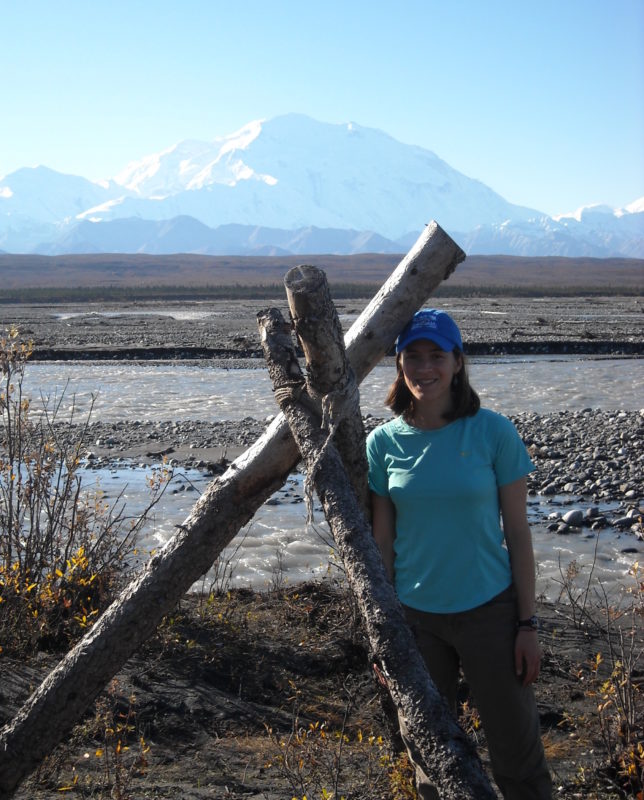
HM: I always knew this novel would be middle grade, not young adult. An agent once suggested that I turn it into a romance adventure, but that is NOT the story I wanted to tell. Over the years, I did tinker with Lily’s age (and Sophie was originally 14, not 18). However, ultimately twelve seemed like just the right age for Lily to be able to physically and emotionally go on this journey.
ABW: I liked the way you gave Sophie more scenes as the story went along, and liked how Lily’s view of her sister changed. Early-on she saw Sophie as a stereotypical teenager, but by the end Lily was grateful for Sophie’s strength, depth, and determination. I thought the change happened organically and authentically. Can you tell me a little about your process in crafting Sophie? Did you plan on writing a story about two sisters? Or did Lily’s Mountain begin as a father-daughter relationship story and morph into the published version?
HM: Oh, how could you tell that this sister story emerged late in the process?
ABW: Hahaha. Well, I wouldn’t say I could tell, not exactly. Just curious about your process!
HM: Lily originally had an older brother named Karsten. After a few drafts, it became clear (from the suggestion of one of my teachers at Vermont College) that I should try to create a sister story rather than a sister-brother story.
I realized that my inclination to write about a brother came from my real-life brother. Growing up, I never knew what it was like to have a sister. It was a fun and challenging experience to rewrite the novel with Sophie as the older sister.
It took several years to tackle Sophie in the novel. At first, she felt a lot like a pretend character. Over the years and drafts (and reading a lot of books with good sister characters), I built her character into the story. It was one of the most challenging parts of writing this story. Ultimately, I felt like Sophie’s age (18) would solve some of the worries about whether Lily could make the trip without a parent involved.
ABW: Sophie really worked as a secondary character, so I’m glad you rose to the challenge.
Now I have to ask about the earthquake! When I lived in California (1976-1981), I experienced a few quakes, and I gotta say—ooooh [shudder]. I wasn’t ever able to shrug off a quake, not the way native Californians seemed to do. When Lily moved on with her adventure after the quake and aftershock, I wasn’t surprised (she was no different from the Californians I’d met), but I wondered how east-coast readers have reacted to that part of the story. Have you gotten any feedback on that, or on any moments that city-dwellers and/or east-coast readers might find alarming?
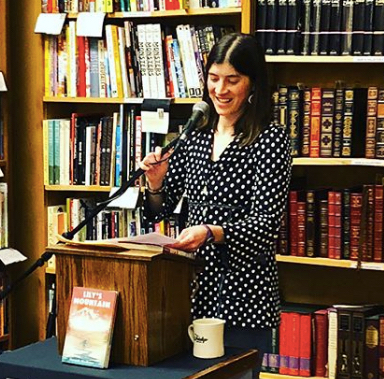 HM: Earthquakes, while somewhat normal in Alaska, are always scary. I think those of us who live in earthquake zones have grown accustomed to them, but we’re always wondering: will this be the next big one?
HM: Earthquakes, while somewhat normal in Alaska, are always scary. I think those of us who live in earthquake zones have grown accustomed to them, but we’re always wondering: will this be the next big one?
The earthquake emerged in one of my earliest drafts of the book. It always felt important to the story because of Lily’s core belief that the earth speaks and is a character just as much as people are characters. It made sense to me that if Lily felt the landscape to be a living character, the earth shaking would echo the turmoil in the earth at the news that her dad was missing.
ABW: I like that—how the landscape echoes the story’s action. How this landscape is a living character. All in all, what a great story!
What advice might you offer to encourage aspiring novelists to hone their craft?
HM: Write for the joy of it. Be open to rewriting, again and again and again. If I’d known how many times this book would be rejected, I might not have written it. But I love Lily’s story, and it gives me so much joy to know that there are readers in the world getting to know Lily and her big adventure.
ABW: Thank you, Hannah, for inviting us to experience a bit of Alaska where “the color of the ice is always changing.” (I learned a lot about Alaska.) And thank you for taking time to do this interview.
HM: Thank you for having me!
ABW: Readers interested in learning more about Hannah and her writing can check out her website, find her on Instagram, and read Helen Pyne’s interview with her at Through the Tollbooth.
-Back to the top of this page-
And now for the BOOK GIVEAWAY details!
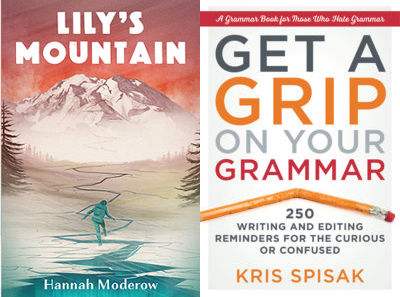
To enter, do ONE of the following (deadline May 10, 2018):
(1) leave a comment below, or
(2) email me at ABWestrick (at) gmail (dot) com and put “giveaway” in the subject line, or
(3) “like” my facebook author page (if you’ve already liked my page, message me the word “giveaway”), or
(4) follow me on Twitter (if we’re already following each other, DM me the word “giveaway”), or
(5) subscribe to my blog by entering your email in the box at the top (right column) and hitting “subscribe” (if you’re already subscribed, email me the word “giveaway”).
I’ll throw all the names in a hat and choose one to receive a copy of Lily’s Mountain PLUS Get a Grip on Your Grammar by Kris Spisak. And why, oh, why, do I have a grammar book to give away? Because Kris ran a contest last month and I won! But I already have Kris’s book, signed to me (thank you, Kris!), so a lucky winner here will get a two-fer.
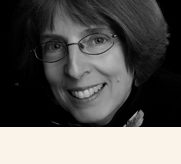
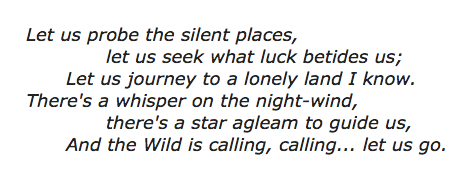
Thank you for the interview, Hannah and Anne! I read and loved Lily’s Mountain! I also noticed that the scene you workshopped that residency at VCFA did not make the final book. It was a beautifully-written scene — I still remember it 8 years later — but it’s a great example of how we often have to let some of our best writing go because it doesn’t fit into that particular story. Maybe the next book!
Great interview! Thank you, Hannah, for the courage to stick to what you know–that a savvy Alaskan kid could make the journey. I traveled across Chicago to school on my own when I was thirteen. Kids often rise to the challenge. Also, I’m so glad your perseverance has paid off. That gives me hope!
Hi Lyn and Linda (aka L. Marie)! How fun to remember workshopping a scene way back during a VCFA residency. Hannah told me she’s working on another book now, perhaps for younger readers, and maybe her other scene will fit there. And as for traveling across Chicago on your own at 13 — an editor in NYC would probably understand that. But following grizzly bear footprints in a remote wilderness?! Hahaha. No way.
Hannah, I can’t wait to read this book! I remember your talented writing from Vermont and look forward to diving into Alaska. I still haven’t made it to Denali but it’s definitely on my bucket list, and I know once I read this book it will move to the top! Congratulations for sticking with this story and having it out in the world for the rest of us to enjoy!
Of all the people I’ve ever met with bucket lists, Meredith — you are the one who really makes it happen! I think you’ve been to every place on your list (or the list as I knew it). Your travels are amazing. And inspiring. I can see you now on the McKinley Bar Trail. Please post photos when you get back!
And we have a giveaway winner! (Will contact privately…)